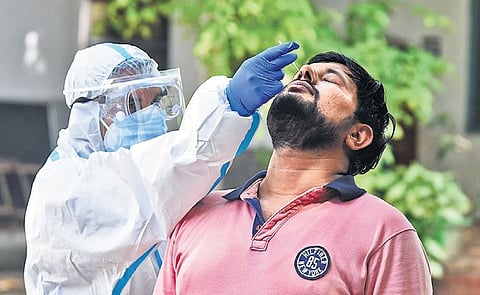

NEW DELHI: Over the past month, the national capital has witnessed a decline in the number of Covid-19 cases. Over the past two weeks, the city has been registering roughly 1,000 new cases daily. While experts claim that the city had already overcome its peak at the end of June, the question remains, will there be a second wave? “There always remains a possibility but the chances of that again happening in Delhi is low.
The second wave can be determined by subsequent surveys. Suppose, in the upcoming sero survey results we get around 50 per cent positivity and again in September we get around 55 per cent, but in the next sero-survey we get positivity of 40 or 30 per cent. That will show that within two months people became more susceptible to the virus and the antibodies are not working…
If the antibodies among those individuals disappear, then more people are going to be vulnerable to the infection,” explained Dr Jugal Kishore, Head and Dean, Community Medicine, Safdarjung Hospital.
Dr Lalit Kant, former scientist ‘G’ and head (Epidemiology and. Communicable Diseases Division), ICMR stated that those who are not yet exposed to the virus have high chances of getting infected, sooner or later.
“Since cases are coming down, residents may tend to take the virus lightly, disobey the physical distancing guidleines and get infected. The possibility is always there. There is no detailed report on how long antibodies last in an individual. There are no follow-ups and no further details on the exposure,” he added.
Dr Kishore mentioned that there are mainly three major reasons which could cause a second wave – presence of a large susceptible population, migrants returning in large numbers to Delhi from other states and the antibody count among those who possess them come down and in turn are make them susceptible to reinfection.
“All three are not going to happen in Delhi. The young population are not going to be clinically significant cases. Reinfection, if it happens, will be few, and that won’t lead to a second wave. There can be a fluctuation of cases. Certain people will not get infected... One major reason is genetics. Certain genes are not susceptible but those set of genes have not yet been identified. Those individuals are not going to get infected even if they don’t have antibodies,” he said.
Virus reproduction rate lower than before
Dr Lalit Kant, former scientist ‘G’ and head of Epidemiology and. Communicable Diseases Division, ICMR, noted that the reproduction rate in Delhi has also come down, which means that an infected person has a less chance of spreading the virus to others